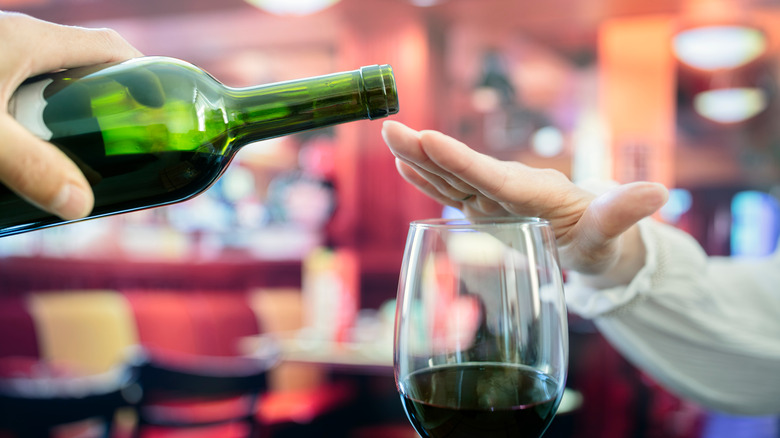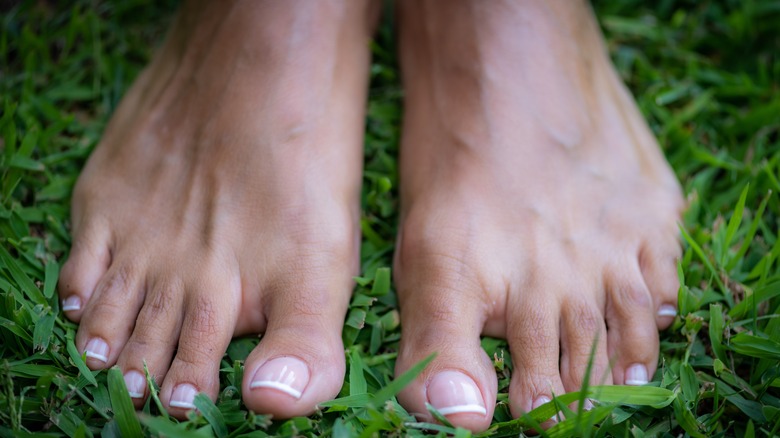The Fall 2023 Wellness Trends You're About To See Everywhere
There's a lot to celebrate when it comes to how we approach our wellness today. Trends in regulating our mental health and spiritual lives are becoming just as important as what we do in our fitness routines. Interest in harnessing feminine power is at an all-time high, as well as learning about what affects our bodies, energies, and why it's becoming an essential part of practicing good health and wellness. We're learning how to avoid toxic products, foods, and situations, while peace is becoming a common goal for many seeking self-love and awareness.
Being tuned into your own needs, however, takes knowledge, skills, and diligence. Many would agree it's worth the effort to feel as healthy as possible for as long as possible. Feeling good is an important part of living life to its fullest, and sharing how to do so is an ever-growing, multi-billion-dollar industry. In late 2022, McKinsey & Company reported, "The wellness market is growing quickly. Overall, around 50 percent of US consumers now report wellness as a top priority in their day-to-day lives, a significant rise from 42 percent in 2020.
This year is no different. As we learn more and more about the importance of good wellness practices, hopefully, we will be able to utilize popular wellness advice for a better collective for generations beyond our own. From sobriety to sleep, here are a few wellness trends that can help you and yours be the best you can be.
Sobriety
The sobriety trend is ramping up. Celebrities like Megan Fox have helped popularize what many are calling "sober curiosity" — the idea that taking a break from alcohol or quitting altogether can lead to a different, healthier lifestyle. Sober curiosity has people looking at the many ways alcohol influences our society. From reducing stress or anxiety to being the central activity of a social event, we have been shaped by our collective reliance on alcohol. Living alcohol-free, or "damp" as popularized by TikTokers, is heralded by medical professionals as a much healthier choice for sustaining a healthy body.
It seems there are as many reasons to drink as there are not to. According to studies reported by the Mayo Clinic, drinking "regular, limited amounts of alcohol, including red wine, seem to have a lower risk of heart disease." However, regarding the practice of alcohol consumption, the Mayo Clinic also says, "If you don't drink alcohol, don't start because of potential health benefits."
Good Posture
Good posture matters, probably more than most realized in the past. However, it's becoming popular to pay attention to how we stand attention. Our blood flow, oxygen intake, and even our confidence are affected by how well we take care of our framework for the body we hang out in. Battling poor ergonomics and digital dementia is a passion of many wellness experts, including American Posture Institute founders Drs. Krista Burns & Mark Wade, who believe it's essential for us to live with "posture by design, not by circumstance."
It's no secret that humans today spend a lot of time sitting while using devices with screens. Our day-to-day requires very different skill sets and muscle groups than those a generation prior to today's working adults. Some believe there is a critical epidemic of poor posture wellness and they blame technology. While advancements in our civilization are indeed keeping us alive longer, we're introducing damaging habits to our posture.
Recent studies tell us that our posture alignment is becoming an ever-crucial part of our overall health. Without a secure core — the muscles around our belly and lower back — our entire systems get out of actual alignment. This, in turn, can ripple to neurological, intellectual, emotional, and spiritual aspects of our lives, as well as the physical. Keep an eye out for more trends in posture wellness in the upcoming months. You'll thank yourself.
Manifestation
Turns out, believing in yourself and the power of your internal vision board is not only trendy but useful. Writer and senior correspondent Rebecca Jennings described manifesting as "the practice of thinking aspirational thoughts with the purpose of making them real." And it's a great description. Manifestation seems to be a little bit of everything from superstition to religion to self-help and successful business practices.
One of the many facets of manifestation like setting intentions, meditation, and the laws of attraction, includes the power and health benefits of gratitude. While healing isn't all sparkly rainbows, hope and non-toxic positivity can be the bright light at the end of the journey. Eliminating negative self-talk and utilizing manifestation practices are popular ways to wellness.
Earthing
Due to the ever-increasing use of technology and the various virtual realities in which we live, earthing or grounding are especially popular mindfulness practices. To ground or earth is also a method used in electrical engineering and, according to Manav Energy, "is critical to protect your infrastructure, equipment, and people from the danger of high voltage and achieve safety from fatal electrical surges." The same goes for the energy running through your systems. Like all Earthly elements, you are a network that conducts energy.
For many, there's an inherent, organic wisdom that lives below our feet, and the closer we can get our bare bodies in direct connection with the earth, the better. Earthing can help with stress, increase your immunity, and give your cells relief from energy overwhelm. The next time you feel the need to go for a walk to relieve stress, take off your shoes, stand barefoot on the grass or soil, and filter some of that overpowering energy through your planet.
Getting enough sleep
There's irony in our fatigue about the overwhelming amount of information inundating our daily routines when it comes to conversations around sleep. But it's something you're likely to hear even more about this season, especially with societal increased efforts towards mental wellness and its link to good sleep. The National Institute of Neurological Disorders and Stroke says that lack of sleep means "you can't form or maintain the pathways in your brain that let you learn and create new memories, and it's harder to concentrate and respond quickly."
In the list of priorities for the survival of life as we know it, as much as we wish it weren't true, sleep is still as important as air and food. Certainly more necessary than tomorrow's meeting and the toxic productivity all-nighter you're pulling to prepare for it. According to the Sleep Foundation, an ideal amount of uninterrupted sleep for an average adult is 7 hours. So be on the lookout for trendy tools to add to your belt to help with sleep and overall wellness for the seasons to come.





